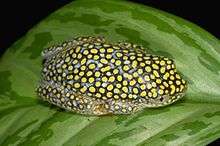Hyperoliidae
The Hyperoliidae, or sedge frogs and bush frogs, are a large family of small to medium-sized, brightly colored frogs which contains more than 250 species in 19 genera. Seventeen genera are native to sub-Saharan Africa.[1] In addition, the monotypic genus Tachycnemis occurs on the Seychelles Islands, and the genus Heterixalus (currently 10 species) is endemic to Madagascar.
| Hyperoliidae | |
|---|---|
 | |
| Heterixalus alboguttatus | |
| Scientific classification | |
| Kingdom: | Animalia |
| Phylum: | Chordata |
| Class: | Amphibia |
| Order: | Anura |
| Clade: | Afrobatrachia |
| Family: | Hyperoliidae Laurent, 1943 |
| Genera | |
|
17 genera (see text) | |
Hyperoliids range from 1.5 to 8 cm (0.59 to 3.15 in) in body length. Many species have smooth, brightly patterned skin that almost looks enameled.[2]
Most hyperoliids are arboreal, but some are terrestrial, including several Kassina species that move by walking or running rather than hopping. Diets vary widely, with examples including Tornierella, which specializes on snails, and Afrixalus fornasini, the only terrestrial frog known to prey on eggs of other species of anurans.
Breeding in this family begins at the start of the rainy season, where hyperoliids congregate at breeding sites. Most hyperoliids lay their eggs in water, although foam nesting, tree-hole breeding, and laying of eggs in vegetation above water are all known behaviors.[2] Afrixalus builds leaf nests for its eggs, by folding and gluing the edges of the leaves. Tadpoles are pond type larvae with large dorsal fins on their tails.
No fossil hyperoliids are known.
Classification
As of mid 2016, there are 17 genera with 222 species, more than half of them in the very species-rich Hyperolius:[3]
- Acanthixalus - African wart frogs
- Afrixalus - banana frogs
- Alexteroon - midwife frogs
- Arlequinus - Mebebque frogs
- Callixalus - African painted frogs
- Chrysobatrachus - Itombwe golden frogs
- Cryptothylax - wax frogs
- Heterixalus - Madagascan reed frogs
- Hyperolius - African reed frogs
- Kassina - running frogs
- Kassinula - clicking frogs
- Morerella
- Opisthothylax - grey-eyed frogs
- Paracassina - common striped frogs
- Phlyctimantis - African striped frogs
- Semnodactylus - Weal's frogs
- Tachycnemis - Seychelles Islands frogs
References
- Shiotz, 1999
- Zweifel, Robert G. (1998). Cogger, H.G.; Zweifel, R.G. (eds.). Encyclopedia of Reptiles and Amphibians. San Diego: Academic Press. pp. 100–101. ISBN 0-12-178560-2.
- Frost, Darrel R. (2016). "Hyperoliidae Laurent, 1943". Amphibian Species of the World: an Online Reference. Version 6.0. American Museum of Natural History. Retrieved 14 June 2016.
Schiotz, A. 1999. Treefrogs of Africa. Edition Chimaira, Frankfurt, ISBN 3-930612-24-0
Further reading
Burton, R.; Burton, M. (2002). "Reed frogs" (PDF). Marshall Cavendish International Wildlife Encyclopedia. Volume 15 (3rd ed.). Marshall Cavendish. pp. 2146–2147. ISBN 978-0-7614-7266-7. Archived from the original (PDF) on 2012-02-29.